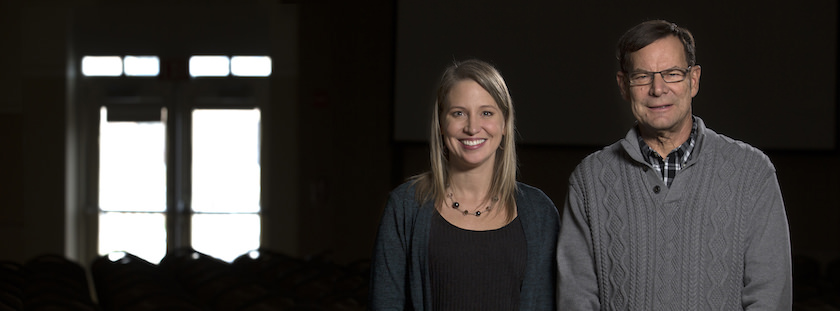Spiritual struggles and mental health

Phrases like “spiritual struggle” and “experiential avoidance” might not typically be heard in everyday conversation, but a short chat with Bowling Green State University psychology professor Dr. Kenneth Pargament and alumna Dr. Carmen Oemig Dworsky explains why they should be. And why they are important concepts for college students to understand.
In simple terms, spiritual struggles are those that involve any great life question, conflicts with God, the meaning of life, or mortality. Experiential avoidance involves attempts to avoid thoughts and feelings even when doing so is ultimately harmful or at odds with personal goals or values.
Through the study of 307 adults, the pair, along with research assistant Serena Wong, a BGSU Ph.D. student, and Dr. Julie Exline, a professor of psychological sciences at Case Western Reserve University, found that avoiding spiritual struggles can lead to poorer mental, physical and psychological health.
Results of the study were recently published in the Journal of Contextual Behavioral Science.
“Spirituality and religion are often neglected or considered taboo,” Pargament said. “Our interest was to study the roles of spirituality and religion in people’s lives for better or worse. See how they help people reach their potential, create struggles, serve as a source of tension.”
Oemig Dworsky added that because 60 percent of people have spiritual struggles, but often don’t discuss them, it was a good question to research.
“Major events can affect us, can shake us spiritually,” Pargament said. “Questions about God, our purpose, whether you’re a good person, whether you’re living up to personal values are common. Spiritual struggles may be the most challenging we face.”
Facing them is key, the two said.
“Avoiding struggles contributes to anxiety and depression,” Oemig Dworsky said. Pargament added that questioning God and faith can also be a source of shame or guilt.
Constantly pushing away big questions isn’t going to work for very long, they found.
“We have the desire to push away things that are threatening, scary,” Oemig Dworsky said. “As a result, our lives become limited. We become less engaged in the people around us and the things we value. Spiritual struggles can be overwhelming to some people.”
“But spiritual struggles are natural, normal, some say a sign of growth and development,” Pargament said.
Instead of reinforcing the stigma associated with spiritual struggles, he suggested embracing the struggles.
“You can go ballistic at a struggle, ignore a struggle or, the third option, use love, compassion, kindness and appreciation to address it,” he said.
To address a struggle, Oemig Dworsky suggests taking – and making – an opportunity to sit with big life questions.
“Writing down conflicts, writing a letter to God, prayer, meditation, these are all ways to embrace struggles instead of avoid them,” she said. “Find resources, a mental health professional or clergy member or family member or friend. Find a person who can meet you with the reality you are facing, realities of being human. And actively face these struggles, even if it’s uncomfortable.”
In 2013, through a program called Winding Road, Oemig Dworsky and Pargament found that similar coping strategies were effective in helping college students address spiritual struggles. These struggles are a common part of college because it is a time of change. Students are meeting new people, figuring out what matters to them, questioning, doubting, facing important decisions and living without the boundaries they’re used to.
Educating clinical professionals and inviting conversations about spiritual struggles are two ways the pair plans to apply their findings.
“Clergy, teachers, they need to be more open to their own struggles; they should be a model,” Pargament said. “When people experience spiritual struggles, they feel alone. They can feel lost. There is incredible value in parents talking with their children about spiritual struggles, in clergy describing their own faith journey, including their own spiritual struggles. There can be bumps along the spiritual path. But you can still continue.”
“You can have struggles and live a life of purpose at the same time,” Oemig Dworsky added.
Hospital chaplains, pastors, mental health professionals and trauma psychologists are interested in this work, which the pair is taking from research to practice.
Updated: 12/02/2017 12:19AM
